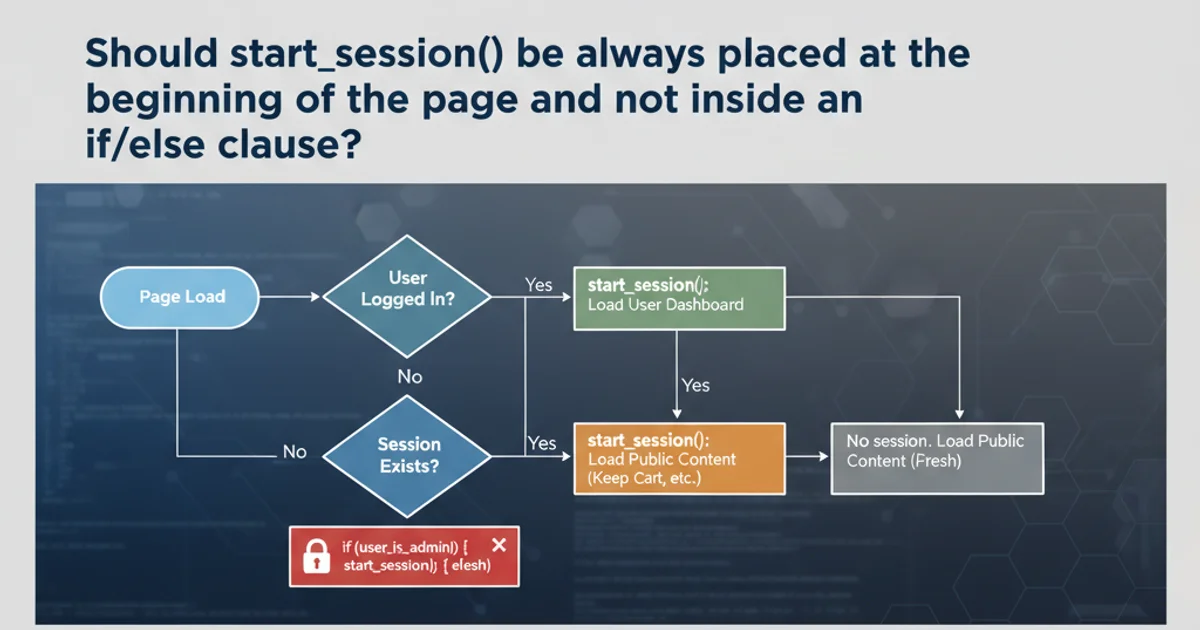Should start_session() be always placed at the beginning of the page and not inside an if/else cl...
Categories:
When and Where to Call session_start() in PHP

Explore the best practices for placing session_start() in PHP, understanding its implications when used within conditional logic, and ensuring proper session management.
The session_start() function in PHP is crucial for managing user sessions, allowing you to store and retrieve user-specific data across multiple page requests. A common question among PHP developers, especially newcomers, is whether this function should always be placed at the very beginning of a script or if it can be safely enclosed within conditional statements like if/else blocks. This article delves into the technical considerations, potential pitfalls, and best practices for calling session_start().
The Core Requirement: Headers Before Output
The fundamental rule governing session_start() is that it must be called before any output is sent to the browser. This is because session_start() often needs to send HTTP headers, specifically the Set-Cookie header for the session ID. If any content (even a single space or newline character outside of <?php ... ?> tags) has already been sent, PHP will issue a "Headers already sent" error, preventing the session cookie from being set and thus failing to start the session correctly.
<?php
// This will cause a "Headers already sent" error
echo "Hello";
session_start();
?>
Incorrect placement of session_start() after output
Why Conditional session_start() is Problematic
Placing session_start() inside an if/else clause introduces a risk. If the condition evaluates to false and some output is generated before the else block (or if the else block itself is not reached), you could still encounter the "Headers already sent" error. More importantly, if a session is required for a significant portion of your application's functionality, conditionally starting it means that some parts of your code might operate without session support, leading to unexpected behavior or security vulnerabilities.
flowchart TD
A[Request Received] --> B{Is Session Needed?}
B -- Yes --> C[Call session_start()]
B -- No --> D[Continue without session]
C --> E[Process Page Logic]
D --> E
E --> F{Output Generated?}
F -- Yes --> G[Headers Already Sent Error]
F -- No --> H[Send Headers & Content]
G -- X --> I[Fatal Error]
H --> J[Response Sent]Flowchart illustrating the risk of conditional session_start()
session_start() can lead to inconsistent application state. If a page sometimes starts a session and sometimes doesn't, it becomes harder to predict behavior and debug issues related to user authentication or data persistence.Best Practice: Always Start Early
The universally recommended best practice is to call session_start() at the very beginning of every script that might interact with session data. This ensures that the session is initialized before any output is sent and before any logic that relies on session variables is executed. This approach simplifies your code, makes session management predictable, and avoids the "Headers already sent" error.
<?php
session_start(); // Always at the very top
// Now you can safely access $_SESSION variables
if (!isset($_SESSION['views'])) {
$_SESSION['views'] = 0;
}
$_SESSION['views']++;
// ... rest of your page logic and output
?>
<!DOCTYPE html>
<html>
<head><title>My Page</title></head>
<body>
<p>Page views: <?php echo $_SESSION['views']; ?></p>
</body>
</html>
Recommended placement of session_start()
Handling Specific Cases: When a Session is Truly Optional
While the general rule is to start early, there might be rare scenarios where a session is genuinely optional for a specific script (e.g., a public API endpoint that doesn't require user state). In such cases, you can still place session_start() at the top, but simply not use $_SESSION variables. PHP's session mechanism is efficient enough that starting a session and not using it has minimal overhead. If you absolutely must avoid starting a session, ensure that no output whatsoever is generated before your conditional check, and that your code path for not starting a session also avoids outputting anything that would prevent headers from being sent later.
session_start() in a single entry point, ensuring it's always called consistently across your application without needing to add it to every single file.